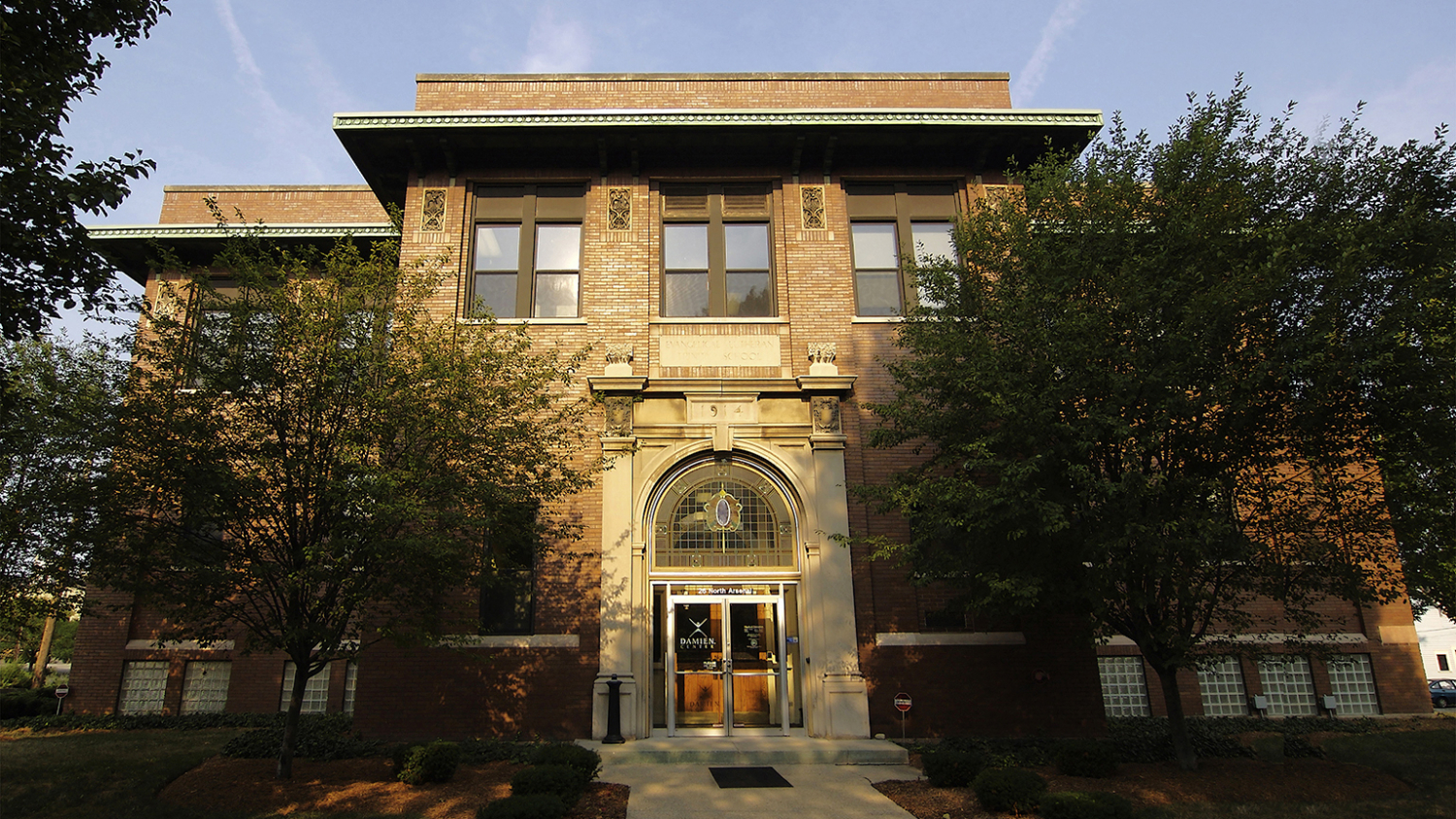In Indianapolis, the first large-scale care center for people with HIV/AIDS was the Damien Center, which opened in 1987. The Damien Center represents the longest sustained and most influential medical project of the Indianapolis , one of the nation’s and city’s oldest HIV/AIDS fundraising and care organizations.
The center was named after a late-1800s Roman Catholic priest, Joseph Damien De Veuster, who dedicated his life to caring for the lepers banished to the island of Molokai, Hawaii. The Damien Center aimed to replicate his work by caring for those with AIDS with compassion.
An unlikely team—the Indy Bag Ladies, represented by Darrell Arthur; the Roman Catholic Archdiocese, represented by Msr. Gettlefinger at ; and the Episcopal Diocese of Indianapolis, represented by Episcopalian minister and AIDS activist Rev. Earl Conner at — brought the project to fruition. The center provided testing, coordinated care for people with HIV and AIDS, housed a food pantry, and other services for people with AIDS in Indianapolis.
With the assistance of Episcopalian minister and AIDS activist Rev. Earl Conner, Arthur convinced the Catholic Archdiocese to allow the use of the former Cathedral Grade School, located at 1350 N. Pennsylvania Street, for the Damien Center. It opened in June 1987 and housed four AIDS-related community groups, including the Buddy Support Program, People with AIDS Coalition Newsletter, Marion County AIDS Taskforce, and the Bag Ladies, Inc. When it opened, leaders of the Damien Center stated that it “provides and coordinates services for persons living with or affected by HIV and AIDS” in the Indianapolis community and “actively advocates for just and compassionate responses to their needs.”

In addition to care coordination, the Damien Center also provided AIDS patient and family support groups and a library of educational tools. By 1989, the Damien Center hosted eight different support groups, each focused on a different aspect of how the AIDS crisis was affecting people. These included an HIV-positive women’s support group, family support group, pastoral counseling, and Alcohol Anonymous meetings.
Arthur served as the Director of Support Services as well as the Buddy Support Program, established in 1985 by Darrell Arthur, an IndyBag Lady, and Dr. Daniel Hicks, a psychiatrist from in Indianapolis to train unlicensed caregivers to aid people with AIDS physically and emotionally. This training allowed them to be paired with a person with AIDS in the community who needed assistance. Many of the original buddies were also Indy Bag Ladies. The Damien Center adopted the program. The Indy Bag Ladies Buddy Support Program was turned over to the Damien Center when it opened in 1987, with Arthur as the program coordinator. The position and responsibilities of buddies were transitioned to care coordinators at the Damien Center.
The Center provided each of these services irrespective of a participant’s ability to pay. It was the first organization for centralized care and services for those affected by HIV and AIDS in Indianapolis. The Indy Bag Ladies focused much of their fundraising efforts on the Damien Center and served as its first volunteers.
The leadership of the Damien Center was established in its early bylaws: its board would be comprised of at least one member from each of the founding organizations. Although the bylaws explicitly stated that only the Catholic archdiocese and the Episcopal Diocese of Indianapolis constituted these institutions, a member of the Indy Bag Ladies also sat on the board for much of Damien Center history. Reverend Conner and Msr. Gettlefinger sat on the initial board. The board was responsible for making most of the long-term decisions for the center.
The DEFA fund, the Direct Emergency Financial Assistance fund, created by the in the late 1990s, provided financial assistance to Hoosiers living with HIV/AIDS in emergency situations. This fund had originally been a part of the Buddy Support Program and was the focus of much of the Indy Bag Ladies’ fundraising. Monies distributed ensured direct care management and assistance through the Damien Center, , and the LifeCare program at .
In 2006, the Damien Center relocated, following a disagreement over passing out condoms, a position opposed by the Catholic Church because of its theological beliefs. Other Damien Center leaders felt this was the number one prevention method for the spread of HIV and AIDS.
The Damien Center continues to provide comprehensive and innovative approaches to the care of those affected by HIV/AIDS in the Indianapolis Community, including care assessment, an on-site medical clinic, counseling services, a food pantry, housing assistance, and case management. It cares for more than 4,000 individuals affected or infected by HIV/AIDS, more than 25 percent of all individuals living with the disease in Indiana.
In 2018 the federal government included on its list of 50 hot spots for HIV. To address the problem the Damien Center announced plans to expand its then-current 15,000-square-foot headquarters to a 56,000-square-foot facility in 2022. A $4 million capital campaign covered part of the $30 million expansion, with other funding derived from the and about $12 million from in-house reserves. The expanded center opened in June 2025 with a dental clinic, outpatient intensive group therapy sessions, and expanded HIV and sexually transmitted testing services.

Help improve this entry
Contribute information, offer corrections, suggest images.
You can also recommend new entries related to this topic.